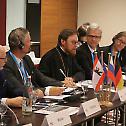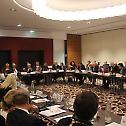16th Russian-German forum of civil societies ‘St. Petersburg Dialogue’ takes place in Berlin
November 23-24, 3017 – the 16th Russian-German forum of civil societies ‘St. Petersburg Dialogue’ took place in Berlin under the theme ‘Public Participation as a Way Towards Mutual Understanding between Russia and Germany’.
The event was attended by representatives of the Russian Orthodox Church including Archimandrite Philaret (Bulekov), vice-chairman of the Department for External Church Relations (DECR), co-chairmen of the Churches in Europe working group of the forum, Archpriest Sergiy Zvonarev, DECR secretary for the far abroad, Rev. Iliya Kosykh, head of the DECR communication service, Ms. V. Leontieva, director for work with the disabled, Synodal Department for Church Charity and Social Service, Ms. M. Nelyubova, DECR secretariat for inter-Christian relations, Mr. M. Shakhnovich, head of the Chair of Philosophy of Religion and Religious Studies, St. Petersburg State University, Hierodeacon Yaroslav (Ochkanov), DECR secretariat for the far abroad, and N. Slovtsev, assistant to the DECR vice-chairman.
From the German church side there were Dr. Dr. Johannes Eldemann, director of the Institute of Ecumenical Theology and co-chairman of the working group from the German side; Prof. Dr. Martin Illert, representative of the Supreme Council of the Evangelical Lutheran Church in Germany; Dr. Dirk Stelter, representative of the Supreme Council of the Evangelical Lutheran Church in Hannover; Klaus Eberl, vice-president of the Synod of the Evangelical Lutheran Church in Germany, Dr. Dorothea Kaess, manager of the ecumenical commission of the German Catholic Bishops’ Conference; Rev. Petra Schwermann, authorized representative of the Evangelical Church of Kurhessen-Waldeck; Ms. Gabriela Hockertz, department for aid to the disabled, Caritas, Catholic Diocese of Berlin; and Dr. Regina Elsner, researcher, Berlin Center of East European and International Studies.
The forum was opened on November 23 with the addresses made by Berlin Governing Mayor Michael Muller and Russian Ambassador to Germany Mr. V. Grinin, and its moderators – Mr. V. Zubkov from the Russian side and Mr. Ronald Pofalla from the German side. Messages of greetings were read out from German Chancellor A. Merkel and Russian President V. Putin.
Reports on the topic of the forum were made by Prof. Dr. Wolfgang Huber, former president of the Evangelical Church in Germany and bishop emeritus of the Evangelical Church of Berlin-Brandenburg, and Prof. A. Fedotov, Presidential adviser and chairman of the Presidential Council for the Development of Civil Society and Human Rights.
On November 24, there was a joint meeting of the Churches in Europe, Civil Society and Mass Media working groups to discuss people’s attitude to the disabled and the work of the mass media in reflecting the social integration of these people.
Then the Churches in Europe group held a meeting on Aid to The Disabled: Experience of Churches in Russia and Germany. The group meeting was co-moderated by Archimandrite Philaret and Dr. Eldemann.
Reports were made of Martine Illert and Ms. V. Leontieva.
Russian and German participants spoke about the experience of rendering aid to the disabled in the Russian Orthodox Church, the Roman Catholic Church and the Evangelical Church in Germany. The discussion focused on the problems and challenges facing religious communities in the two countries in this area of work. Both Russian and German participants agreed on the need to involve the disabled in church and public life and pointed to the profound moral dimension of this topic.
The work of the forum concluded with a meeting that summarized the results of the work carried out by St. Petersburg Dialogue.
St. Petersburg Dialogue is a forum of civil societies in Russia and Germany. Established in 2001 at the initiative of Russian President Vladimir Putin and Federal Chancellor Gerhart Schroeder, it is called to promote and deepen mutual understanding between Germany and Russia and to develop further the bilateral cooperation in all spheres of society.
The Churches in Europe working group is one of the youngest units in the St. Petersburg Dialogue structure. It held its first meeting in 2007 in Wiesbaden. The working group includes representatives of Christian confessions in Russia and Germany. The group holds regular meeting in turns in Russia and Germany.
Source: mospat.ru





